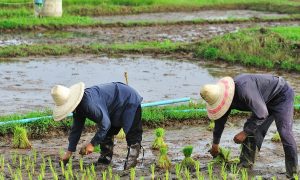China completes world’s first rice gene index database, provides free service for global scholars

China has set up the world’s first comprehensive rice pan-genomic database based on homologous genes—the rice gene index database, which will provide free online search and analysis service for rice research scholars worldwide.
The database, established by Professor Zhang Jianwei’s group at the National Key Laboratory of Crop Genetic Improvement, Huazhong Agricultural University, in collaboration with universities and research teams at home and abroad, is like a proximate dictionary, in which every gene of Asian rice can easily find homologous or similar genes, as well as trace its evolutionary history.
Asian cultivated rice is a staple food for half of the world’s population. It is recorded that there are approximately 780,000 rice accessions in the world, of which more than 130,000 Asian rice germplasm and its wild relatives are collected in the GeneBank of the International Rice Research Institute.
The database built by Zhang’s group took a high-quality genome representing the structure of the Asian rice population as the target, to complete whole-genome sequencing and gene annotation as its basic data information.
Currently, the fundamental database is stored at Huazhong Agricultural University and is open for free access worldwide.
Zhang told the Global Times on Thursday that despite the large data volume of the new facility, it is very logical in organization and management and runs very smoothly.
“As the improvement of data can support the analysis of common biological problems, we have also improved the functions, from the real-time comparison of gene and protein sequences to rapid retrieval of bulk homologous genes, viewing their structural variation according to the results, and generating phylogenetic trees,” Zhang said.
According to the professor, the contribution of the database to the community may initially not be directly estimable, but he can foresee that the use in China will certainly grow rapidly. “Geneticists and breeders will be potentially freed from bioinformatics analysis work, such as rice genetic data comparison, structural variation identification and gene function prediction, and they can focus more on analyzing rice genetic laws and improving rice yield and quality for significantly increasing rice productivity, which will reflect China’s international responsibility to secure the global food,” Zhang noted.
“Our resources are also open to and benifit scientists and breeders worldwide, and our main partners are located in the US, Europe, the UK and South Asia, and their use will represent an important role of our database in the international efforts,” the expert added.















